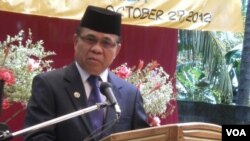MANILA —
The head of the Philippines’ largest Muslim rebel group is looking ahead to challenges in the remaining rounds of talks to hammer out final peace with the government. Both sides are hopeful the agreement will put an end to the Muslims’ four-decade fight for self-determination that has left more than 120,000 people dead.
The chairman of the Moro Islamic Liberation Front met with reporters for the first time since the signing of a preliminary peace agreement between the group and the Philippine government two weeks ago. Under the hot sun in the sprawling rebel headquarters of Camp Darapanan, Murad Ebrahim called the signed document “the best political solution” crafted by any Muslim group in Mindanao, in the country’s southern third. But he noted it is only a first step.
“Please be reminded that this task ahead is bigger and more complex and complicated, translating this agreement into reality on the ground,” he said.
The preliminary agreement sets guidelines for creating a region in the western half of Mindanao called Bangsamoro. The name, coined by the rebels years ago, stands for all natives of the land including Muslims, non-Muslims and indigenous people. It would effectively replace the Autonomous Region in Muslim Mindanao, in the same location, which was a result of a 1996 peace agreement between a smaller Muslim group and the government.
Under the preliminary pact, the region will have power to set up its own parliamentary government, levy taxes and generate revenue, among other tasks. The Philippines government would oversee areas such as national security, foreign relations and monetary policy.
Murad says the next steps to a final peace agreement will see the completion of provisions for power - and wealth-sharing. Then, shaping the intergovernmental relationship and the details on the decommissioning of arms will immediately follow. Both negotiating panels say this could happen by December. This would set the stage for completing the transition to the new Bangsamoro entity by 2016.
MILF negotiator Attorney Michael Mastura attended the press conference. He says there was euphoria among the group when the deal was first signed. But Mastura, who likens himself to “the villain in any good story,” cautions that the four main provisions- or annexes- are very difficult to iron out.
“If and when these annexes and all the documents cannot be accommodated by the present constitution, I will repeat what I said before: the present constitution is too narrow a framework to negotiate what the Bangsamoro aspire for,” said Mastura.
This has been a sticking point throughout the past 15 years that both sides have been negotiating in talks peppered with violent eruptions. President Benigno Aquino’s team of negotiators have said in the past there would be no need to change the constitution.
The two panels meet next in the second week of November.
The chairman of the Moro Islamic Liberation Front met with reporters for the first time since the signing of a preliminary peace agreement between the group and the Philippine government two weeks ago. Under the hot sun in the sprawling rebel headquarters of Camp Darapanan, Murad Ebrahim called the signed document “the best political solution” crafted by any Muslim group in Mindanao, in the country’s southern third. But he noted it is only a first step.
“Please be reminded that this task ahead is bigger and more complex and complicated, translating this agreement into reality on the ground,” he said.
The preliminary agreement sets guidelines for creating a region in the western half of Mindanao called Bangsamoro. The name, coined by the rebels years ago, stands for all natives of the land including Muslims, non-Muslims and indigenous people. It would effectively replace the Autonomous Region in Muslim Mindanao, in the same location, which was a result of a 1996 peace agreement between a smaller Muslim group and the government.
Under the preliminary pact, the region will have power to set up its own parliamentary government, levy taxes and generate revenue, among other tasks. The Philippines government would oversee areas such as national security, foreign relations and monetary policy.
Murad says the next steps to a final peace agreement will see the completion of provisions for power - and wealth-sharing. Then, shaping the intergovernmental relationship and the details on the decommissioning of arms will immediately follow. Both negotiating panels say this could happen by December. This would set the stage for completing the transition to the new Bangsamoro entity by 2016.
MILF negotiator Attorney Michael Mastura attended the press conference. He says there was euphoria among the group when the deal was first signed. But Mastura, who likens himself to “the villain in any good story,” cautions that the four main provisions- or annexes- are very difficult to iron out.
“If and when these annexes and all the documents cannot be accommodated by the present constitution, I will repeat what I said before: the present constitution is too narrow a framework to negotiate what the Bangsamoro aspire for,” said Mastura.
This has been a sticking point throughout the past 15 years that both sides have been negotiating in talks peppered with violent eruptions. President Benigno Aquino’s team of negotiators have said in the past there would be no need to change the constitution.
The two panels meet next in the second week of November.




